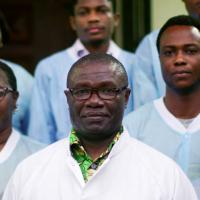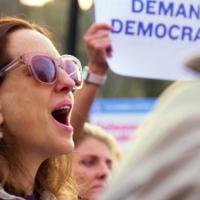When it comes to the experiences of Asian Americans and Pacific Islanders (AAPIs) in the United States, there’s no such thing as one-size-fits all. The group (which represents 6.1% of the population) is incredibly diverse, both in terms of culture and background.
“There’s complexity within the community,” said EunSook Lee, director of the AAPI Civic Engagement Fund, one of the only funds in the country that supports grassroots AAPI groups to build power and achieve policy and systems change..
“There are different ethnicities and languages. But the complexities are an asset,” says Lee.
While these complexities present a cultural richness, they can also be a roadblock to civil engagement. AAPIs are the fastest growing demographic in the country, but, as a group, are less engaged in civic life compared to other demographics. This has led to the AAPI population being underrepresented in elected office, especially in the criminal justice sector, according to Politico.
A new movement is attempting to clear these roadblocks — and, if it succeeds, it will not only lead to more civic engagement among Asian Americans and Pacific Islanders, but can serve as a blueprint for anyone fighting for a more inclusive society.
Obstacles to civil engagement
Cultural differences and language barriers may make it difficult for anyone to engage in civic life, and the AAPI population is no exception. The pandemic and subsequent lockdowns have exacerbated these barriers.
“One of our goals is ensuring that AAPIs feel that they have both a sense of responsibility and right, and a duty to participate.”
EunSook Lee
She added that they do that by “providing resources for groups to reach out to communities, making sure that information is available in other languages, and that culturally competent forms of outreach is carried out.”
The AAPI Civic Engagement Fund was formed in 2013 to strengthen the AAPI community and foster more civic engagement. The group invests heavily in different AAPI advocacy groups across the country.
“Until our formation, funding to local AAPI community groups had been chaotic and episodic,” Lee tells Freethink.
“When you’re looking at a constituency that has historically been underinvested in, there really has to be deep investment year round to support community engagement.”
The organization looks at the problem holistically and funds many different organizations providing a range of support from crisis-response, to expanding voting access, to fighting deportation.
This lack of civil engagement didn’t happen overnight. The AAPI community has faced a long history of violence and discrimination in America. For example, there was the Rock Springs Massacre of 1885, targeting Chinese; the Chinese Exclusion Act of 1882, which banned Chinese men from entering, and the Japanese internment camps from WWII.
“This injustice and discrimination was codified by law. If we know how embedded this is, the solutions we’ve pushed for have to be bigger and bolder than before.”
EunSook Lee
Crisis Response
One group that Lee’s organization funds is Asian Americans Advancing Justice, Atlanta, or AAJA. They provide a range of services — from legal counsel, to voter registration, to crisis response.
And the crisis response team has been busy.
Since the start of the pandemic, more attention has been brought to the racial issues that many in the AAPI community face. This culminated in March 2021, when six Asian women were killed in a deadly massacre in Atlanta.
After the shooting, Advancing Justice, Atlanta got to work providing support to the community, making sure that those who needed help coping with the violence were able to find counselors or social services they needed.
“We were on the phone all night long,” Stephanie Cho, executive director of Advancing Justice, Atlanta. “We quickly got information and then we set up an emergency fund.”
The camera crews and reporters have since moved on from the violent attack, but Advancing Justice, Atlanta is still providing needed support. Cho notes that the hate mail sent to her organization continued after the attack.
“Our hate mail really went up,” said Cho, “so we’re fighting back that rhetoric all the time, through our legal services, advocacy work and our civic engagement and organizing work.”
This work extends to everything from providing translators at voting sites — a service that is not legally required in Georgia — to advocating for policy changes that can empower people who have been affected by these systemic barriers.
Criminal Justice
Lee’s team at the AAPI Civic Engagement Fund understands that to really foster civic engagement, investment in the community needs to happen year-round — not just during election cycles. That’s why the fund works with groups like the Southeast Asian Freedom Network (SEAFN) to empower people that have been impacted by regressive policies.
“After the United States military came into Cambodia, Laos, and Vietnam and destabilized the countries, South East Asians came here with the promise of stabilization, of full democracy,” said Sarath Suong, national coordinator of the Southeast Asian Freedom Network.
“But when we came together and supported each other, they called us gangs and then threw us into gang databases.”
That led to a deportation crisis for South East Asians, who are at least three times more likely than other immigrants to be deported due to past criminal convictions.
Through the freedom network, Suong is aiming to destigmatize deportation and provide a safe space for those who are dealing with legal issues to simply talk with each other. Suong organizes activities like camping trips so that people in the community can come together.
“This is big for us because it gives us a chance to bond and it’s a relief, too, to be able to be able to come and hangout,” says Kab Feng, a Cambodian immigrant who came to the US as a teenager but got himself into legal trouble at 17. He’s been on the deportation list since the 1990s.
“It definitely gives me therapy.”
SEAFN provides more than social activities, however — they’ve been able to leverage their national network to bring back deportees and reunite them with their families.
While everyone in the AAPI community has unique personal stories, the challenges that the community faces are similar to that of many marginalized communities in the US.
The work of the AAPI Civic Engagement and the groups they fund throughout the country, can be an example of how people can come together and build a better, more inclusive future for everyone.
“We are dedicated to this because we live here,” said Cho. “This is our home. We want it to be better.”
For more stories from Skoll and Freethink, visit the hub here.


